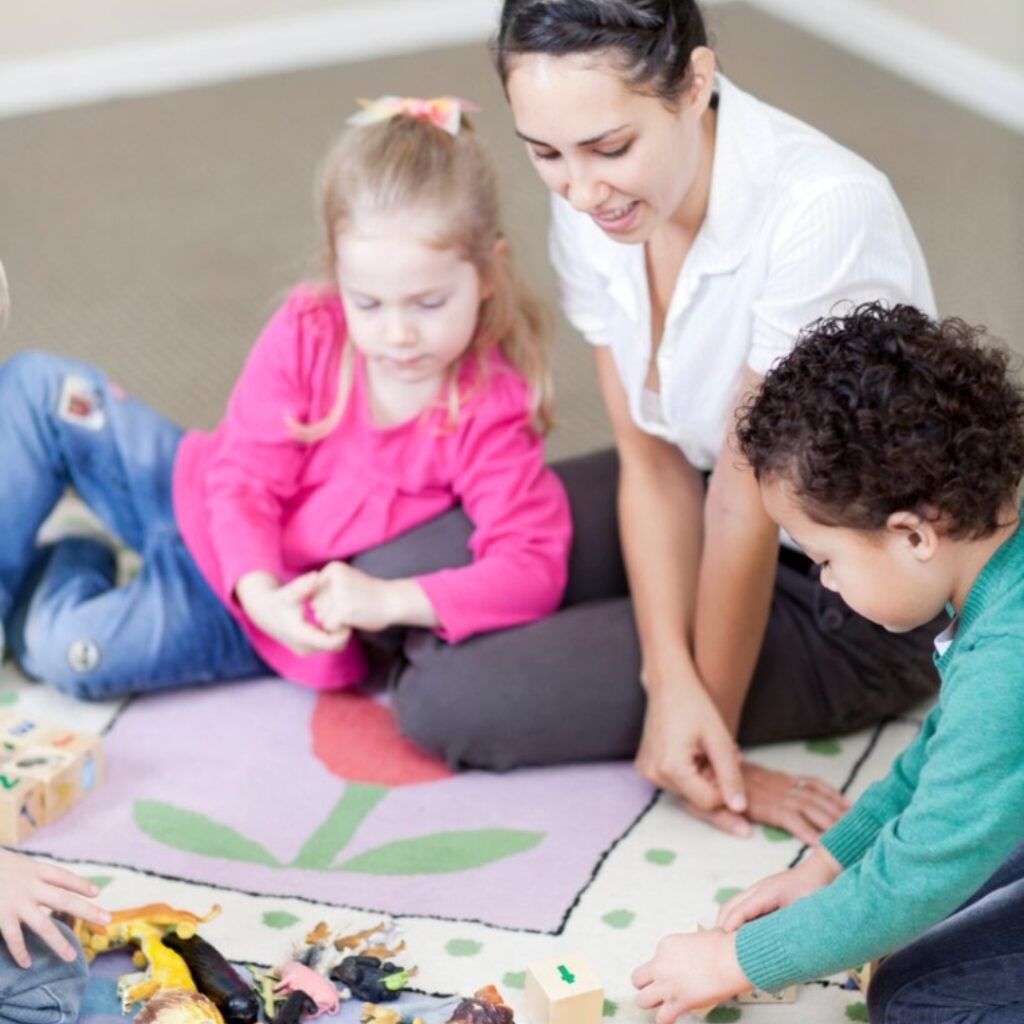Raising Trilingual Kids: Insights From Korean-Taiwanese-American Parents
Several years ago when we were dreaming of raising multilingual children, we knew no families balancing English, Korean, and Mandarin. Over the years, I’ve gradually met similar trilingual families, and the Dai family has been a great inspiration for me.
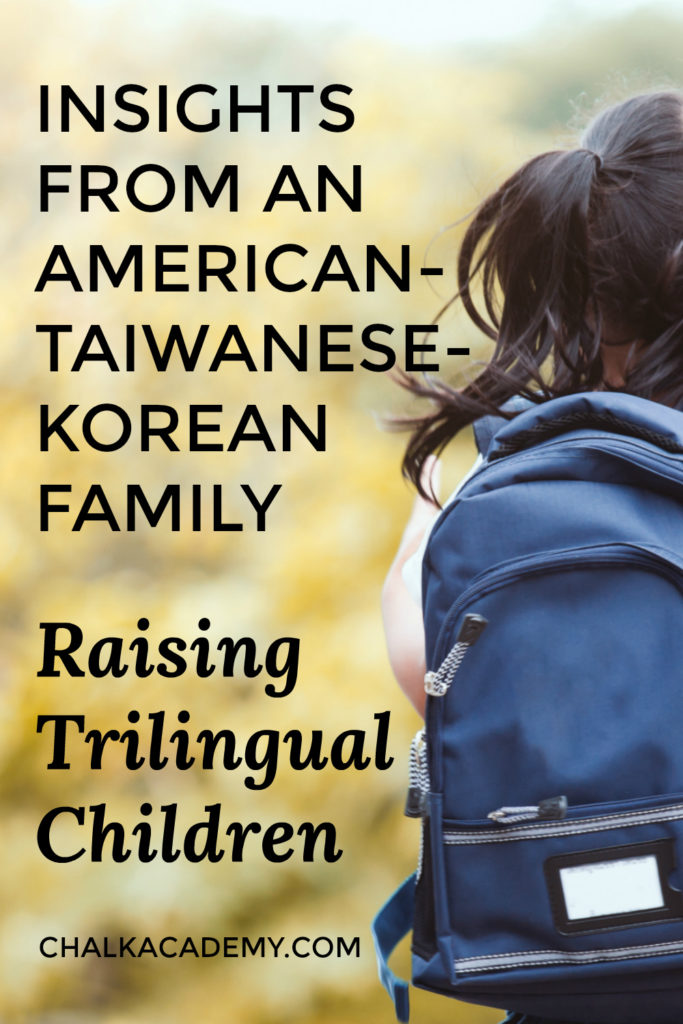
Sarah and Jake Dai are living in Southern California with their two young children. Like our family, they are Christian, and their kids speak English, Mandarin Chinese, and Korean. Their oldest child is currently enrolled in a Korean Dual Language Program.
I got the chance to interview Sarah and learn about her experience with raising trilingual kids. As you learn about her family’s journey, you’ll see the benefit of speaking the minority languages at home, even if a child attends an immersion school or travels abroad. Here is Sarah’s story!
Tell us about your trilingual family!
I was born in Baltimore, Maryland, and was raised in Carrollton, Texas, a suburb of Dallas. My older sister was born in Korea but came to the United States with my parents at the age of 2. The languages I speak are English, Korean, and Mandarin Chinese.
My husband, Jake, was born in Taiwan but moved to the United States when he was 1 year old. He is fluent in Mandarin and took Chinese classes in college. He can also read Zhuyin Fuhao (bopomofo).
Currently, we live in California with our 5-year-old son and 2-year-old daughter.
We use the “One Parent One Language” OPOL method. I speak Korean to our children, and my husband speaks Mandarin Chinese to our children. We also all speak English.
How were you able to acquire Korean and Mandarin languages during your childhood?
I grew up speaking Korean at home and I learned Mandarin Chinese in college. I minored in Korean language and studied abroad in Korea for one semester in college.
Korean language acquisition in early childhood
When we were really young, we spoke Korean mixed with a regional dialect Satoori (사투리), which is not considered standard Korean.
Even though my parents spoke formal Korean, my grandmother, whom lived with us, mostly spoke Satoori. As a result, my sister and I were raised speaking a lot of Korean Satoori.
When I was 4 years old, my mom taught me how to read and write Korean.
Related: Handmade Cards for Reading and Writing Practice (English, Chinese, and Korean)
Bilingual challenges in elementary school
When I started Kindergarten, my sister and I initially attended Korean language school on Saturdays and my mom was also my Korean teacher in the class. Well, Korean Saturday School only lasted 3 weeks for us!
Since we already knew how to speak and write Korean, my parents withdrew us from the school. So growing up, I did not have a strong background in Korean grammar nor did I have much formal language instruction once I started school.
In elementary school, I quickly spoke less and less Korean and more and more English just because I lived in a predominantly Caucasian area.

Summer abroad in Korea helps language fluency
What helped my language skills immensely was immersion. When I was 8 and 9 years old, I spent 2 summers in Korea. My mom sent my sister and me to live with our relatives in Korea for 3 months at a time, forcing me to speak Korean since none of my relatives spoke English very well.
One of my uncles, an elementary school principal, enrolled us as students at his school. We were not required to do homework, but our job was to make friends.
Language experience in high school
The language immersion experience did help my fluency at that time, since I was exposed to more vocabulary and grammar. However, we were not consistent about studying Korean language while in the United States. By the time I was in high school, even though I understood Korean, I responded in English or “Konglish” (Korean and English mixed together).
It was not until I was in college where I took formal Korean language classes that I was taught formal Korean grammar.
What challenges did you experience with growing up bilingual in the United States?
Being bilingual was difficult because I felt like I did not know each language thoroughly well, and my vocabulary in both languages was limited.
My parents spoke Korean at home and were not fluent in English. In conversations, I felt like the same 500 Korean words were used, so I did not have a strong, diverse Korean vocabulary.
Even though I spoke English fluently, the adults in my family did not, and thus, I also did not know as many English vocabulary words compared to my peers at school. When asked to read Korean, I was so slow and it took forever!
When did you start introducing different languages to your trilingual kids?
I started speaking Korean to my children since the day they were born. I truly believe children who hear a foreign language at a younger age have a higher ability for foreign language acquisition when they are older.
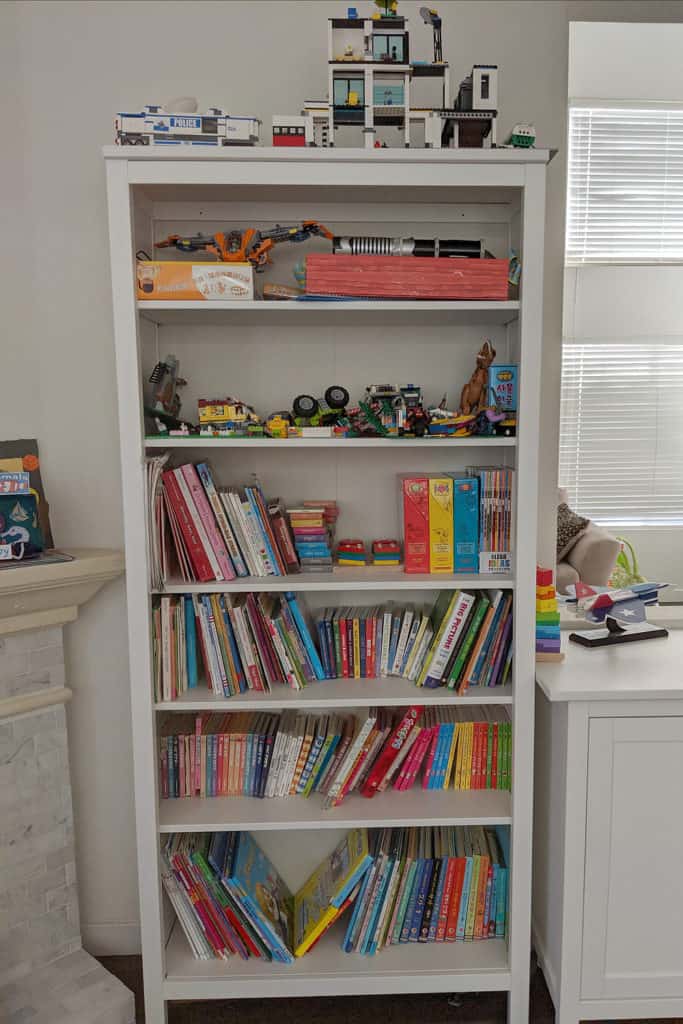
How do you divide time with speaking English, Korean, and Chinese with your trilingual kids?
Since we follow the OPOL method, I mainly speak Korean to my children. It was only recently, when my son turned 4 and learned to read in English that we began to read English books. He also responds in both English and Korean now because his peers are mostly comfortable speaking English to each other.
Up until the age of 4, he only responded to me in Korean. To help continue his Korean language learning, I still converse in Korean and read Korean books to him.
If my son responds to me in English, I translate his answer into Korean and have him repeat what I said. During reading time, we read books in both languages.
For my daughter, I also use the OPOL method and only speak and read Korean to her. Due to her brother’s influence, she has more exposure to the English language than my son did at the age of 2.
Since they also converse mostly in English to each other (but sometimes Korean, too), my daughter responds to me in English about a third of the time. If my daughter responds to me in English, I will translate what she said into Korean and have her repeat it, too.
My husband is responsible for the Chinese language curriculum in our home. He also follows the OPOL method and speaks in Mandarin Chinese and English to our children. Our children respond in both Mandarin and English to my husband and their Mandarin-speaking grandparents.
Related: Korean and Chinese activities for children
How did you decide on Chinese versus Korean immersion school?
We initially wanted to have our children in a Chinese dual language program close to our home, but we did not live in that school’s district. The cost to move to that area was not within our budget.
After that, we looked at Korean dual language programs (KDLP), and found more options around our city. We chose our Korean dual language school based on location and cost of housing.
At Korean immersion school, what is the schedule for Korean and English instruction?
My son just started Kindergarten and is enrolled at a Korean Dual Language Program (KDLP) near our home. The class is divided with the teacher speaking both Korean and English 50/50.
For Kindergarten enrollment in KDLP, it is not required to already have any knowledge of the Korean language. Thus, our son’s class consists of children who speak Korean at different levels.
I have noticed, for the most part, the children respond to each other in English. If an adult speaks to a child in Korean, the child will respond in either Korean or English.
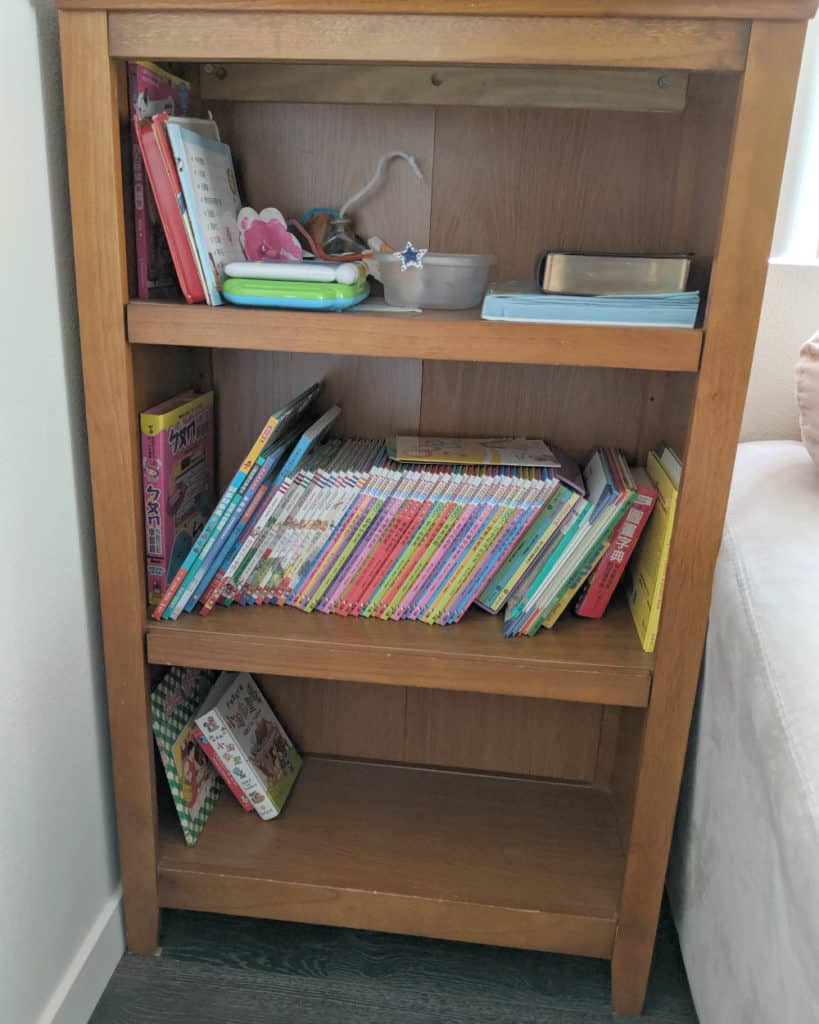
What language do your trilingual kids prefer to speak?
My son prefers to respond mostly in the English language because most of his peers speak comfortably in English.
However, I noticed if my son is isolated with only me, then he will respond more in Korean.
For my daughter, she speaks mostly Korean to me and if she responds to me in English, I will repeat what she said in Korean and have her say it.
The language they use is also determined by their environment. For example, because we attend a Korean church, our children know to respond to certain people in Korean and to others in English.
During prayer and worship time, which language does your trilingual family use?
Because we use the OPOL method, during prayer and worship, I mainly use Korean, but I will translate in English as well. This is so my children are exposed to both vocabulary used in prayer and worship.
If my husband is praying and having a time of worship with our children, then he will speak in Mandarin.
There are times where I’m not familiar with Korean Christian vocabulary, so I try to find the word I intend to use beforehand, and then use it.
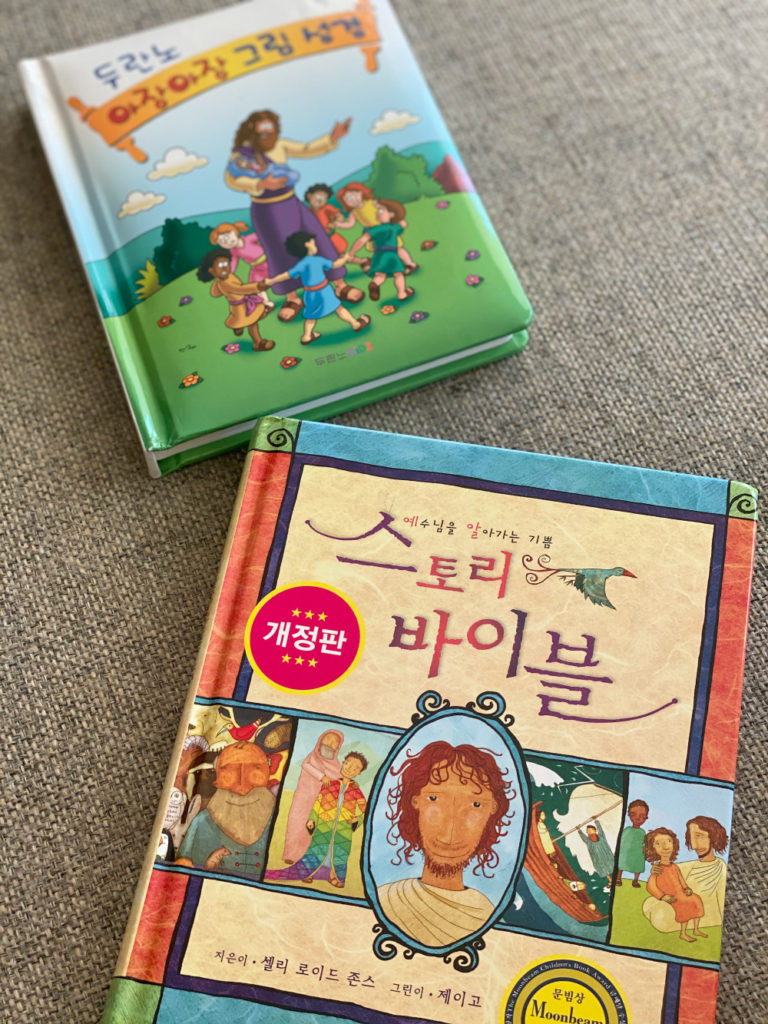
We’ve reviewed very simple, but important themes from the Bible: sin, how God hates sin, and why we need Jesus Christ to save us.
It is difficult for me to explain the Gospel message in Korean, so my son cannot articulate the Gospel message in Korean, too.
However, I try to expose our kids to both Korean and English when it comes to Bible lessons. The Korean Christian books I read to our kids are not as deep, so I make more effort to explain the situation in both Korean and English.
What challenges have you faced with raising trilingual kids?
After enrolling our children in full-time preschool, we noticed a gradual change of their responses. Our children now speak more English than Korean or Mandarin.
This is not bad, but I was a little discouraged at first because I thought all my efforts in teaching my children Korean were going down the drain!
I really felt horrible about it, but then I decided it was best to just emphasize Korean at home and to help them learn both Korean and English, since I am responsible for teaching those languages to my children.
What are your top 3 tips for parents who are raising trilingual kids?
1. Be consistent
I recommend continuing to use the foreign language at home because it is very easy for the foreign language skill to deteriorate if not used on a consistent basis.
A prime example is my childhood. Even though I was raised in a Korean-speaking family, I was not comfortable speaking it at home by the time I was in high school.
And it was not easy to re-learn Korean in college! It took a mass amount of time and effort on my part!
Don’t feel discouraged if you cannot switch from one language to another as easily.
Practicing helps! Over time, it will come naturally to you
When my children were born, I immediately started speaking to them in Korean and it became a habit. There is nothing awkward for me to speak to my husband in English and then switch to Korean when addressing our children.
2. Parents can learn along with kids
When my son was born, I was determined to use the OPOL method. This meant that I had to learn Korean children songs too!
I only remembered 2 or 3 Korean children’s songs from when I was a child, so I took time to find lyrics and memorize them.
It’s very easy to memorize because you are singing them over and over again. I also learned new songs, too, and even looked at Korean Christian songs to sing to our children!
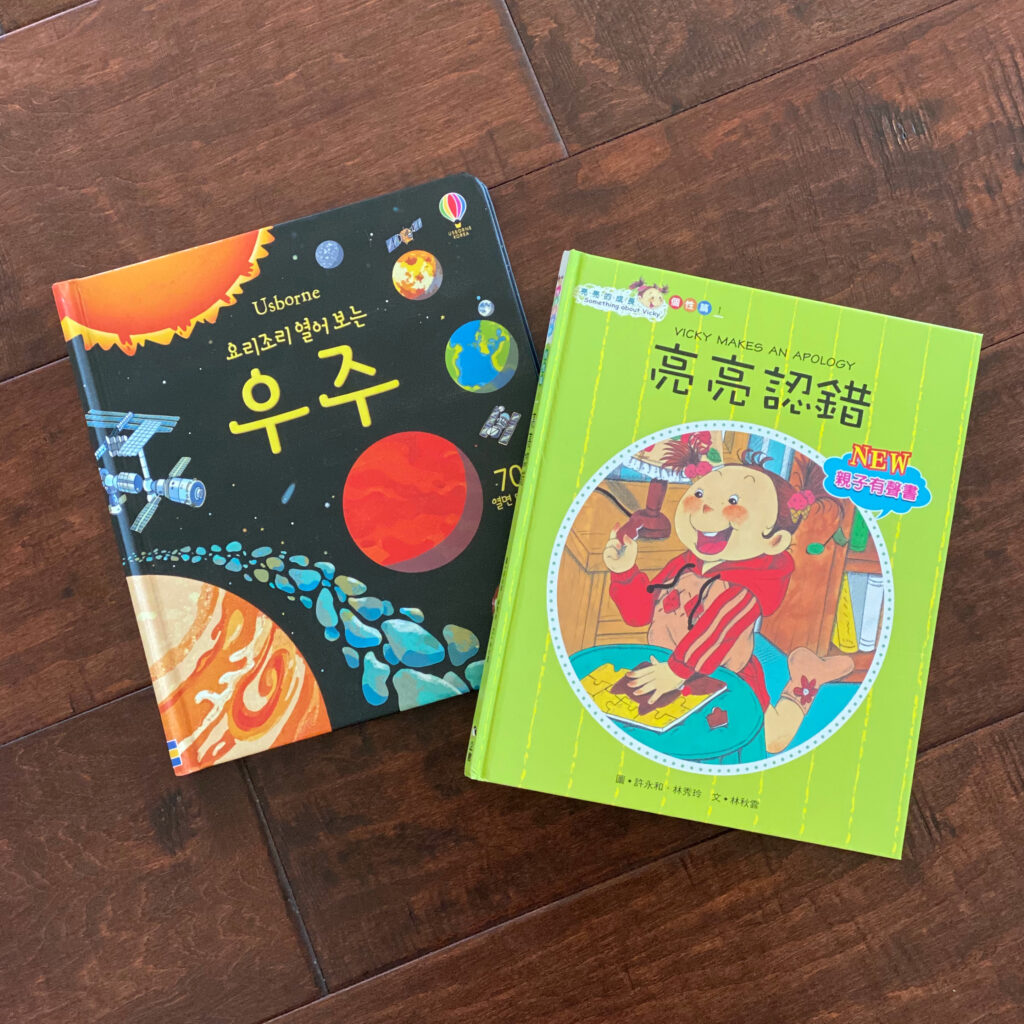
3. Invest in Korean and Chinese resources
We received used Korean books but also invested in a lot of Korean and Chinese books for children.
This has helped so much, because we read every night to our children. Our children LOVE to read books and we are constantly looking for new books to buy for our kids to give as Christmas and birthday gifts!
I also bought a CD of Korean songs to play in the car and at home.
Many thanks to Sarah Dai for sharing her insights and motivation for raising her children in Korean, Mandarin and English!
As you can see, even with travel abroad and dual language immersion programs, speaking the language consistently at home is very important for optimizing language skills!
Please leave a comment if you have any questions about raising trilingual kids or would like to share your experience!

